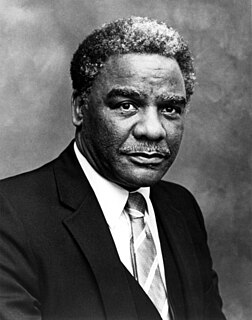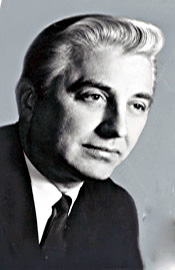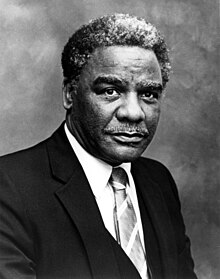
Harold Lee Washington was an American lawyer and politician who was the 51st Mayor of Chicago. Washington became the first African American to be elected as the city's mayor in April 1983. He served as mayor from April 29, 1983 until his death on November 25, 1987. Born in Chicago and raised in the Bronzeville neighborhood, Washington became involved in local 3rd Ward politics under Chicago Alderman and future Congressman Ralph Metcalfe after graduating from Roosevelt University and Northwestern University School of Law. Washington was a member of the U.S. House of Representatives from 1981 to 1983, representing Illinois's first district. Washington had previously served in the Illinois State Senate and the Illinois House of Representatives from 1965 until 1976.

Eugene Sawyer Jr. was an American businessman, educator, and politician. Sawyer was selected as the 53rd Mayor of Chicago, Illinois after the sudden death of then–mayor Harold Washington, serving from December 2, 1987 until April 24, 1989. A member of the Democratic Party, Sawyer was an alderman, and the second African-American to serve as mayor of Chicago.

Roman Conrad Pucinski was an American Democratic politician from Chicago, Illinois. He was a U.S. Representative from 1959 to 1973 and alderman from the 41st Ward of Chicago from 1973 to 1991. He was considered a longtime leader of Chicago Polonia and was seen to represent its interests in Washington.

From January 29 to June 4, 1996, voters of the Democratic Party chose its nominee for president in the 1996 United States presidential election. Incumbent President Bill Clinton was again selected as the nominee through a series of primary elections and caucuses culminating in the 1996 Democratic National Convention held from August 26 to August 29, 1996, in Chicago, Illinois.

Robert Eugene Pincham was an American attorney active in the field of civil rights who served as both a judge of the Circuit Court of Cook County and later a judge of the Appellate Court of Illinois.

The 1986 Illinois gubernatorial election was held on November 4, 1986. Republican candidate James R. Thompson won a fourth term in office, defeating the Illinois Solidarity Party nominee, United States Senator Adlai Stevenson III, by around 400,000 votes.

The Chicago mayoral election of 1995 resulted in the re-election of Democratic Party nominee incumbent Richard M. Daley over independent candidate Roland Burris, with 359,466 votes to Burris's 217,024. Daley won 60.1% of the total vote, winning by a landslide 24-point margin. The Republican candidate, Raymond Wardingley, fared poorly, with only 2.8% of the vote. The fourth nominee, Lawrence Redmond of the Harold Washington Party, won 0.9% of the votes.

The Chicago mayoral election of 1991 resulted in the re-election of incumbent Democrat Richard M. Daley to his first full-term. Daley had previously been elected to serve the remainder of Harold Washington's unexpired term in a special election held following Washington's death in office.

The Chicago mayoral election of 1989 saw Democratic nominee Richard M. Daley win election to the remainder of an unexpired mayoral term with a 14% margin of victory. This marked a return for the Daley family to the office of mayor. Daley was elected over Alderman Timothy Evans, the nominee of the newly formed Harold Washington Party, and the Republican nominee Ed Vrdolyak.

The Chicago mayoral election of 1987 was first the primary election on February 24, 1987 followed by the general election on April 7, 1987. The election saw the re-election of Chicago, Illinois' first African-American mayor, Harold Washington. Ed Vrdolyak, the leader of the Vrdolyak 29, unsuccessfully opposed him, running on the Illinois Solidarity Party ticket. Former mayor Jane Byrne, who served from 1979 until 1983 unsuccessfully challenged Washington in the Democratic primary.

The Chicago mayoral election of 1983 was first the primary on February 22, 1983, which was followed by the general on April 12, 1983. The election saw the election of Chicago, Illinois' first African-American mayor, Harold Washington. Incumbent Mayor Jane Byrne, who had served since April 16, 1979 had lost re-nomination in the Democratic primary in a three-way race between herself, then–Congressman Washington, and then–State's Attorney Richard M. Daley in February 1983. Washington would face off against Republican nominee Benard Epton, winning with a 3.7% lead over Epton in the general election.

Chicago has held regularly-scheduled popular elections to select the city's mayor ever since it was incorporated as a city in 1837.

Elections were held in Illinois on Tuesday, November 4, 1986.

The Cook County, Illinois general election was held on November 5, 1996.

The Cook County, Illinois general election was held on November 3, 1992.

The Cook County, Illinois general election was held on November 6, 1990.

The Cook County, Illinois general election was held on November 8, 1994.
Raymond "Ray" G. Wardingley is an American perennial candidate who has many times, unsuccessfully, sought office in Chicago, Illinois. He is most famous for having been the Republican nominee in the 1995 Chicago mayoral election, and for having previously performed as a clown under the name "Spanky the Clown".

Elections were held in Illinois on Tuesday, November 5, 1940.

Elections were held in Illinois on Tuesday, November 3, 1936.









